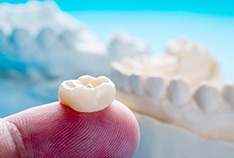


Here at Evans Street Dental, we are proud to offer a variety of restorative treatments that can help teeth once again function and feel like new. One of those treatments is dental crowns. We carefully design these restorations to fit in with a patient’s existing dentition and help them regain a strong, pain-free bite. Would you like to know more about dental crowns in McMinnville and how they may be able to help you enjoy your best smile? Keep reading below.

A dental crown is a tooth-shaped cap that fits over the entire visible portion of a tooth (everything above the gumline). It can fulfill a number of different purposes:
Dental crowns can be constructed out of various materials. We generally recommend metal crowns (which can be made out of gold, silver, or other metals) for the back teeth because metal is so strong. For the front teeth, all-porcelain crowns are generally the best option. Porcelain looks nearly identical to natural tooth enamel, and it is strong enough to stand up to everyday wear and tear. Porcelain fused to metal crowns are also an option in many cases.

Placing a dental crown usually takes two appointments. During the first appointment, Dr. Ramsay prepares the tooth by removing a bit of enamel. This step is necessary to ensure that the crown will fit well and won’t cause you to have an unbalanced bite. Then, we take impressions of the tooth and the surrounding area. Dr. Ramsay sends those impressions, along with detailed notes, to a local dental laboratory. The laboratory fabricates the permanent crown.
While the laboratory is working, you will wear a temporary crown to protect your tooth. When your permanent crown is ready, you’ll return to our office for your second appointment. Dr. Ramsay will verify that the crown is a perfect fit before she attaches it to your tooth.

Dental crowns have numerous benefits, including:
Would you like to learn more about dental crowns in McMinnville, or do you suspect that you need one? Contact our friendly team to ask questions or schedule a consultation. We are ready to help you achieve the healthy, strong smile that you deserve!

As great as dental crowns are, you may fear their price. Fair enough – a treatment can’t help if you don’t have the money for it. However, the cost of dental crowns varies by patient. That means you’ll need to see Dr. Ramsay for an exact estimate. From there, we’ll work to make your crown(s) affordable. Our team can even guide you through the relevant cost factors and payment options. For more details, keep reading or call our office today!

Before placing a crown, Dr. Ramsay will first assess your mouth. Doing so lets her determine your treatment’s final price. In particular, it helps her learn cost factors like:
Given the factors above, note that cheap crowns won’t help you much. Their low price reflects their quality. As such, try to get a functional, long-lasting crown – even if it costs a bit more!

Generally, dental insurance does cover dental crowns. It usually views the caps as a necessary form of medical care. Consequently, a policy often covers up to 50% of a crown’s cost.
Even so, there are some exceptions. The occasional policy may not cover crowns, or its coverage will be severely limited. You should thus confirm your benefits before treatment. If necessary, our office can even help you do so.

Even without insurance, dental crowns can still be affordable. There’s always the option of trying a practice’s financing options. Given a suitable one, you could buy a high-quality crown that fits your budget.
For an example, just take a look at Evans Street Dental. We happen to offer:
Ultimately, Evans Street Dental wants to give you pretty, budget-friendly crowns. That being the case, visit us to get details on financing them!
Most patients can expect their dental crown to last anywhere from five to 15 years. Of course, the exact lifespan can vary significantly from person to person depending on how well it’s taken care of. Even though dental crowns are not considered permanent, the process of getting one is. Dr. Ramsay will need to reshape the tooth in preparation for your restoration. And unlike hair and nails, natural tooth enamel will never grow back once it’s removed. Because of that, the underlying tooth will always need a dental crown for protection against further damage.
The only way to know for sure whether or not your dental crown needs replacement is to have X-rays taken or have it looked at by Dr. Ramsay. However, there are warning signs that can indicate a crown is nearing the end of its lifespan, such as pain, instability, a noticeably worse appearance, and a dark line at the crown’s base.
Before preparing a tooth for a dental crown, Dr. Ramsay will numb it with a topical anesthetic to ensure you feel no pain during the procedure. If you suffer from severe dental anxiety, you can ask about receiving sedation to help ease your nerves. After your tooth is reshaped, it will likely feel sensitive for the next few days. Luckily, you can manage your discomfort by taking prescription or over-the-counter pain medication as needed. Make sure you contact our team at Evan Street Dental if your discomfort worsens.
Generally, dentists will only recommend getting a dental crown if it’s absolutely necessary. Because of that, it’s always best to schedule your procedure shortly after finding out that you need one. Otherwise, the affected tooth will be exposed to chewing forces, food debris, and bacteria, causing the decay or damage to worsen. If you allow it to go untreated for too long, it may eventually need a root canal or even an extraction. By choosing to get a dental crown as soon as you need it, you can preserve as much of your natural tooth as possible and avoid needing more expensive, complex procedures down the line.